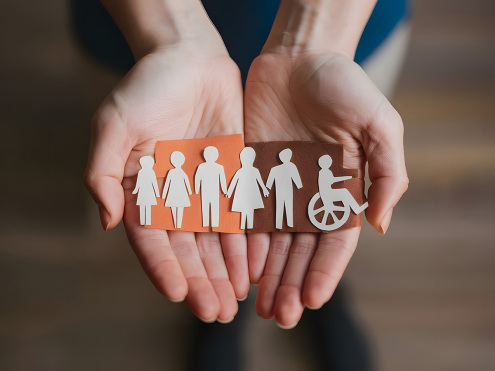Procedural pilots
Overview

© AdobeStock
Young people with a disability or impairment often face major challenges. Questions arise, such as:
What help are we entitled to?
How can we get support?
Where and how do applications have to be made?
And what should we do if help is refused?
It is often not so easy for parents of children with disabilities to find the right path through the multitude of assistance options and applications and to actually obtain the assistance.
Since 1 January 2024, there has been an entitlement to advice and support from a procedural guide. Their task is to provide information about the integration assistance benefits available and to assist with the application and enforcement of claims.
The counselling provided by the procedure guide is free of charge, confidential and can be used at any point during the procedure.
Who is the offer of help aimed at?
|
Children, adolescents and young adults up to their 27th birthday with a (potential) mental, physical or psychological disability or sensory impairment |
|
Mothers, fathers and other legal guardians |
|
Other legal guardians, such as foster parents or carers in residential facilities) |
|
Legal carers and guardians |
Important: A confirmed diagnosis is not required for counselling!
Questions and answers
What are the tasks of a process controller?
Procedural guides are persons of trust who support those affected and their families when claiming integration assistance services
Procedural guides have a sympathetic ear and always act confidentially
They advise on entitlements and possible procedures for obtaining integration assistance services
Procedural guides provide practical tips and help, for example, with filling out forms or formulating an application or objection
They can provide information about specific assistance providers and also establish contact with them
Procedure guides can be consulted throughout the entire procedure. They can also take part in the planning procedure as support.
When and how does counselling take place?
Counselling by procedure pilots can take place at any time before or during the procedure for applying for integration assistance benefits
The person concerned or their relatives can contact the procedural counsellors
The counselling is confidential, independent and non-binding, and is also free of charge
It usually takes the form of an initial telephone or face-to-face meeting at the authority
The initial focus of the counselling is on assessing the personal situation: Who needs counselling and support? What impairments exist? What difficulties are there in participating in society? What are the wishes and goals of those affected and their relatives?
This is followed by a realistic assessment of the need for help and counselling or referral to the responsible public agency or other agencies in the regional help network
On request, the process guide will accompany you to appointments and discussions with other organisations or as part of the planning process
What integration assistance services are available in accordance with SGB VIII and SGB IX?
The catalogue of possible integration assistance services is extensive and not exhaustive
There are four possible benefit groups:
- Benefits for social participation
- Benefits for participation in education
- Benefits for participation in working life
- Benefits for medical rehabilitation
Possible benefits can be
- Early intervention: support and encouragement for children with disabilities or developmental delays
- Measures to ensure school attendance, e.g. through school support or school integration aids
- Assumption of costs for learning therapies for dyslexia/dyscalculia or autism therapy
- Services for social participation such as assistance services, help with housing or leisure activities
- Mobility assistance, e.g. transport services
- Measures to restore and improve health, e.g. physiotherapy, occupational therapy
- Curative education services




